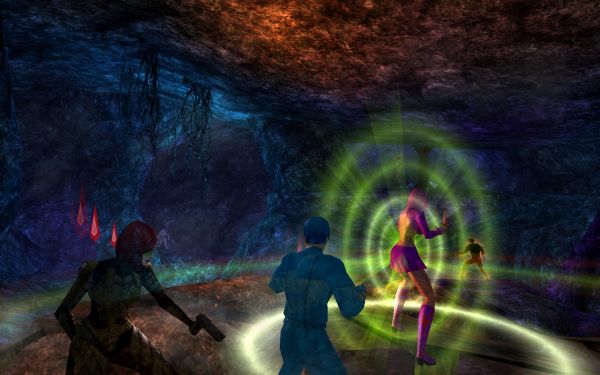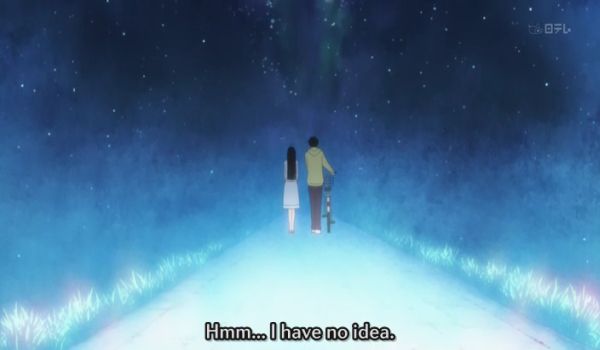
“You never thought angels wore business suits,” says Edison in the anime “The Laws of Eternity”. Well, I am starting to see lots of angels around, even if some of them may be angels only for me.
Stephen Jay Gould is famous for his claim that if we could rewind evolution and run it again, we would end up with a completely different biosphere, and certainly not with anything resembling humans. I have to admit that my life looks a lot like that too. But strangely, both evolution and I somehow moved in the right direction, as if subtly influenced by some Great Attractor far beyond our sight. Today I will regale you with the tale of how I ended up with half a bookshelf full of Ryuho Okawa’s books. It is almost as unlikely as life itself!
I know exactly where my reality branched off from what should normally have happened. It was the day I bought, on a whim, an issue of the Norwegian magazine Komputer. It was a magazine for owners of home computers, and this was back when the World Wide Web was fairly new here in Norway. One of the fascinating sights on this new medium was Jennicam. Jenni was a young American woman – a student back when she started this – who lived her life on webcam. She had cameras in both the living room and the bedroom, taking one picture a minute throughout the day and night. People watched her spend her days in front of the computer, and nights sleeping.
I was one of the curious people who checked out her web site after reading about it in Komputer. Naturally I would be curious about what women actually do, strange and unfamiliar beings that they are. Unlike some of her viewers for sure, my curiosity was not primarily sexual, although I did collect a few nice, small (by today’s standard) pictures of her butt, usually in jeans. Pretty tame, I guess. My “buttpic of the month” was a homage to her for getting me started down the path to my own journal.
It was another girl of the same sort, Debra of Soyaratcam (New Zealand) who actually showed me how to do it. She was also living a pretty tame life on the web in the same style, but then her software broke down. For many days, she could not show the automatic pictures of her life. So she wrote a few lines and had a typical picture from the day on top. I pretty much adopted her format, down to the size of the picture, in my original JPG diary. (I think I even took that phrase from her. I searched the Web but found no one else who had it, so for months I thought I was the only one in the world after she went back to her webcam and eventually disappeared.)
After some months, I happened upon another like me. I found that they did not call their diaries diary but “journal”. Searching on this revealed a small community of several hundred people. This was before the age of the blog, so that was pretty much the world population of online diaries at the time. We were pioneers. But more pioneer than I was Al Schroeder, author of the journal Nova Notes. You will find numerous references to this in my early archives. We were strikingly similar in temperament and outlook, despite living on different continent, and despite him being married to a fellow geek and having three sons, two of which were autists. OK, that may be a similarity rather than a difference: It seems now that autism, or at least the main form of it, comes from geeks having children with each others. The same genes that make people smart and able to concentrate, in double dose causes them to become hypersensitive and apt to disappear into their own world.
I counted Schroeder as a friend for several years, and I guess I still do, but he eventually stopped writing his journal to concentrate on his online comics. Before he got that far, however, he had already established contact with other web comic artists, and started to review some of them. One of the first was Sinfest, which despite its name is not about a lot of sin but a kind of philosophical comic with stereotypical people and frequent appearances by God, angels and the Devil. There is a surprising dignity to it, for a humorous comic. I never saw any malice in it, even as it relentlessly revealed human folly in its many forms. If it had not been that good, Schroeder would not have recommended it, and neither would I have continued looking at other online comics.
But I did. I started reading lots of them for a while. Over time, it became common to have forums where readers could write about their impressions, and this often turned into general discussions about life, the universe and everything. Many of the comic creators were college students, and so were many of their readers. Intelligent, curious and often lonely, they were interesting people to get to know. I made many of my online friends this way. And especially from the Acid Reflux forum. Despite its name, it was not about the illness (which I also have to some degree) but a comic that seemed to attract particularly interesting readers. It also saw two of those readers marry each other, and then two more. But unfortunately the writer and the artists did not. So it came to an end, but not before putting me on the next path.
One of my friends there was very enthusiastic about something called “anime”. It turned out to be Japanese cartoon movies. Both these and comic books are even more popular in Japan than here, perhaps because their books are written in an extremely hard to read script, with a mix of sound signs and concept signs. In any case, this girl was in love with these cartoons. She also fell in love with one of the guys on the forum – not me, luckily for them both – and they are still married. But I had found a new interest. While I read very few online comics anymore (mostly those by Al Schroeder, actually), I watch anime fairly regularly.
Japanese culture certainly is fascinating. It is different but still kind of understandable. It is also very varied. Here in Scandinavia at least, Japanese manga (comics) and anime (cartoon movies) are mostly famous for sexually explicit content. The line between pornography and art goes quite a bit further to the sexy side in Japan, it seems. It is perfectly normal for non-religious anime to have random sightings of girls’ panties, for instance. In all fairness, Japanese school uniform skirts really are that short, so in school buildings with stairs it may well happen much the same way in real life. I am not sure why they do this. Then again, it is a foreign country.
I don’t watch anime for that purpose. (That would be crossing the river for water, seeing how I live in Scandinavia, but I also try to live with some degree of self-control when it comes to such things, despite being single.) My favorite are humorous slice of life movies. Luckily there are many of those too.
I was expecting something like that when a fellow anime fan shared a copy of the anime The Laws of Eternity last year. It seemed to be an interesting adventure by a bunch of friends who more or less by accident end up in the spirit world. Well, it is that, but mainly it is a way to visualize the teachings of the religious organization Happy Science (Kofuku no Kagaku, literally “Science of Happiness”). This particular movie was about the spirit world, which can be seen as both the afterlife and our state of mind while we are alive. The attitudes of the various heavens or hells are actually found in people alive in this world, and I could recognize them easily.
This was how I bumped into Happy Science, and I was surprised by the effect of the movie. I watched it repeatedly, sometimes twice in the same day, something I almost never do. I felt that watching it made it easier to live the way I wanted to in my daily life. I have tried to buy this and other movies from the organization, but this seems to be hard to do for an individual. They probably have their reasons for that, though I don’t know what.
Google Books lets you read a few scattered pages of a book online if the publisher allows this. That is the case with the English translations of the Happy Science books. By reading those few pages, I realized that these books were even more inspiring than the movie. They were more practical and down to earth, an everyday wisdom that added to the understanding I had gained through my own Christianity. Seeing the same things from a different perspective gave me a sense of depth that I had lacked before, or at least had less of.
I am still not sure what to say about this, or what will happen with my life from here on out. But this came into my life just when I was finally ready to understand it. If not for idly buying that magazine that day, it is quite unlikely that I would have bumped into them in my lifetime.
There are many such “coincidences” in my life. But then again there are many such coincidences in the world. Suspiciously many, don’t you think?










